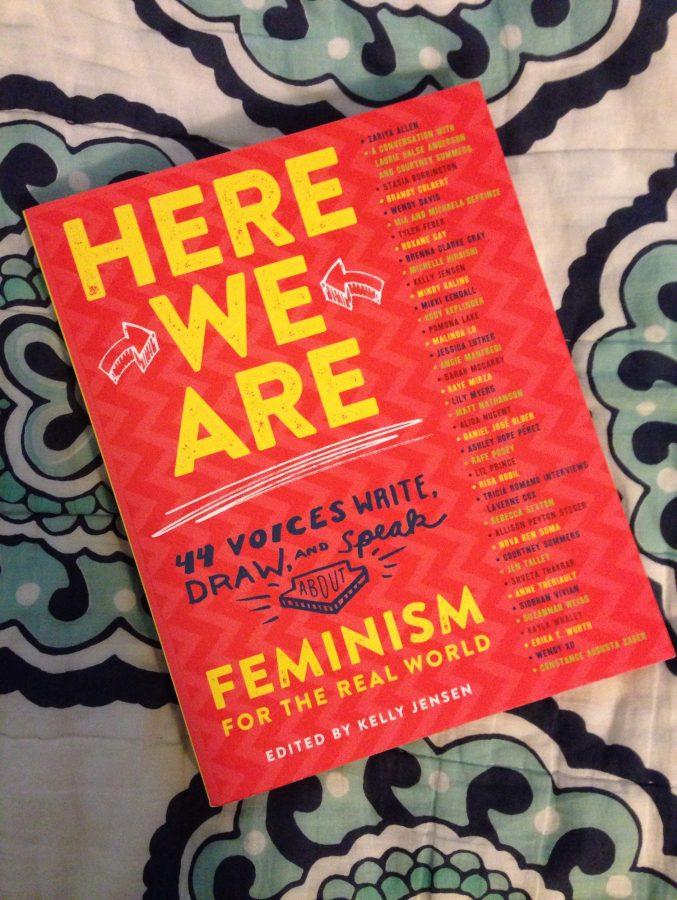“Here We Are” Presents Feminism in All Its Complexity and Value
February 21, 2017
The feminist movement has been described in many different ways: Revolutionary, empowering, man-hating, overwhelmingly white. It has been criticized both justly and unjustly. It has experienced transformation, from the initial women’s suffrage movement to today’s ongoing battle for reproductive rights. With Here We Are: Feminism for the Real World, editor and blogger Kelly Jensen, along with over 40 contributors, seeks to present feminism in all its facets, from intersectionality to body-shaming to internalized misogyny. The result is a fantastic collection of essays, poems, and even comics, all about one of the most important political movements our world has seen.
In reviewing Here We Are, it’s hard to know where to even start, simply because there is so much the book talks about. It begins with the history of feminism and then moves into the feminism and society of the present day, with pieces organized into seven different chapters. These chapters talk about body-shaming, relationships, confidence, and more, and they are filled with an incredible range of different voices and stories.
It is this incredible range that made me want to read Here We Are in the first place. In a time when mainstream feminism all too often ignores the struggles of women of color, transgender women, and disabled women, it is important that this anthology aims to include those voices and amplify them. Writer Mikki Kendall writes about the harm caused by a feminism that is exclusionary and erases the contributions of black women, while Constance Augusta Zaber writes about her love of make-up and how it helped her learn to love herself, especially when she began telling people she was a girl. Wendy Xu’s comic “The Princess and the Witch” addresses the fear that a teenage romance may have been based (at least in part) on her being nothing more than a fetish, and authors Courtney Summers and Laurie Halse Anderson discuss society’s conversations surrounding rape and how they have and haven’t changed in the past twenty years (and why they reject the label “rape books”). This wide range of voices represents so many facets of feminism that I was instantly captivated, and I found myself hard-pressed to ever put the book down to do something else.
As a teenage girl who is often disheartened by the way this world treats women and girls, reading Here We Are felt a little like coming home-or, at least, coming into a place where all women are valued and all women’s voices are important. Lily Myers’ piece on warring with herself internally as to what and how much she should eat reminded me of some of my own feelings, and Anne Thériault’s story of coping with anxiety and depression was one in which I could see myself. These stories tackle so many different things, but the idea that permeates it all, that is mentioned again and again and again, is that girls deserve to be loved and supported–and that they are, even if it’s not always by society as a whole.
When I first opened the pages of Here We Are, I knew there were parts of it that would make me feel fired-up and angry, ready to dismantle the patriarchy piece by piece. And it did-it made me furious at all the different things women have to face in this world, and it made think about my own personal privilege, as a white, cisgender girl. It made me want to fight, and it made me want to speak up while also listening to others. But the one feeling I hadn’t been thinking about when I first picked it up, but which was nevertheless incredibly important, was comfort. Here We Are tells girls, repeatedly and in so many different ways, that they are important. That they are loved and that they are not alone. It feels like a connection, and it feels like a welcoming into a world of feminism for everyone. It is true that modern-day feminism still has a lot of work to do, both in the wider world and within the movement itself. But this book makes it feel possible that this work can be accomplished. And that’s what makes it so important.




